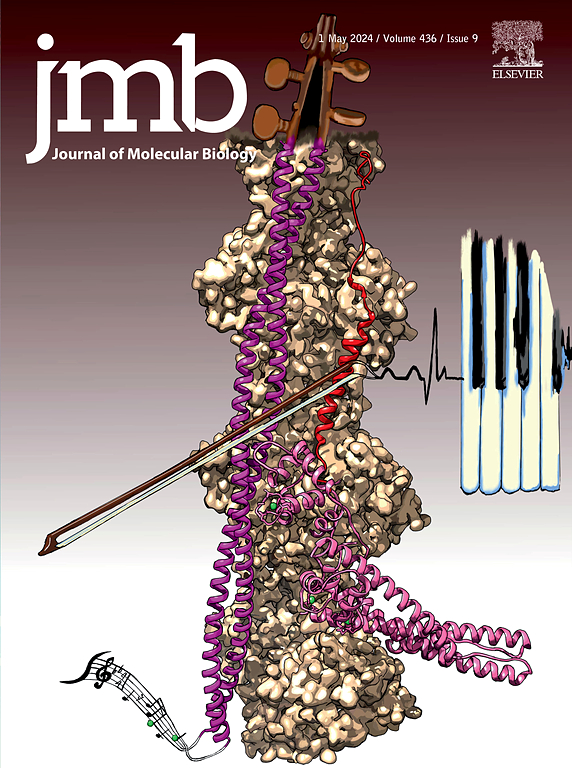Stabilizing Mutations Enhance Evolvability of BlaC β-lactamase by Widening the Mutational Landscape
IF 4.7
2区 生物学
Q1 BIOCHEMISTRY & MOLECULAR BIOLOGY
引用次数: 0
Abstract
Antimicrobial resistance is fueled by the rapid evolution of β-lactamases. However, a gain of new enzyme activity often comes at the expense of reduced protein stability. This evolutionary constraint is often overcome by the acquisition of stabilizing mutations that compensate for the loss of stability invoked by new function mutations. Here, we report three stabilizing mutations (I105F, H184R, and V263I) in BlaC, a serine β-lactamase from Mycobacterium tuberculosis. Using a severely destabilized variant as a template for random mutagenesis and selection, these three mutations emerged together and were able to fully restore resistance toward the antibiotic carbenicillin. In vitro characterization shows that all three mutations increase chemical and thermal stability, which leads to elevated protein levels in the periplasm of Escherichia coli. We demonstrate that the introduction of stabilizing mutations substantially enhances the evolvability of the enzyme. These findings illustrate the important role of stabilizing mutations in enzyme evolution by alleviating function-stability trade-offs and broadening the accessible evolutionary landscape.

稳定突变通过扩大突变景观增强了BlaC β-内酰胺酶的可进化性。
β-内酰胺酶的快速进化加剧了抗菌素耐药性。然而,新酶活性的增加往往是以降低蛋白质稳定性为代价的。这种进化约束通常通过获得稳定突变来克服,这些突变补偿了新功能突变引起的稳定性损失。在这里,我们报道了来自结核分枝杆菌的丝氨酸β-内酰胺酶BlaC的三个稳定突变(I105F, H184R和V263I)。使用一种严重不稳定的变体作为随机突变和选择的模板,这三种突变一起出现,并能够完全恢复对抗生素卡比西林的耐药性。体外鉴定表明,这三种突变增加了化学和热稳定性,从而导致大肠杆菌外质蛋白水平升高。我们证明了稳定突变的引入大大提高了酶的可进化性。这些发现说明了稳定突变在酶进化中的重要作用,通过减轻功能-稳定性的权衡和扩大可获得的进化景观。
本文章由计算机程序翻译,如有差异,请以英文原文为准。
求助全文
约1分钟内获得全文
求助全文
来源期刊

Journal of Molecular Biology
生物-生化与分子生物学
CiteScore
11.30
自引率
1.80%
发文量
412
审稿时长
28 days
期刊介绍:
Journal of Molecular Biology (JMB) provides high quality, comprehensive and broad coverage in all areas of molecular biology. The journal publishes original scientific research papers that provide mechanistic and functional insights and report a significant advance to the field. The journal encourages the submission of multidisciplinary studies that use complementary experimental and computational approaches to address challenging biological questions.
Research areas include but are not limited to: Biomolecular interactions, signaling networks, systems biology; Cell cycle, cell growth, cell differentiation; Cell death, autophagy; Cell signaling and regulation; Chemical biology; Computational biology, in combination with experimental studies; DNA replication, repair, and recombination; Development, regenerative biology, mechanistic and functional studies of stem cells; Epigenetics, chromatin structure and function; Gene expression; Membrane processes, cell surface proteins and cell-cell interactions; Methodological advances, both experimental and theoretical, including databases; Microbiology, virology, and interactions with the host or environment; Microbiota mechanistic and functional studies; Nuclear organization; Post-translational modifications, proteomics; Processing and function of biologically important macromolecules and complexes; Molecular basis of disease; RNA processing, structure and functions of non-coding RNAs, transcription; Sorting, spatiotemporal organization, trafficking; Structural biology; Synthetic biology; Translation, protein folding, chaperones, protein degradation and quality control.
 求助内容:
求助内容: 应助结果提醒方式:
应助结果提醒方式:


